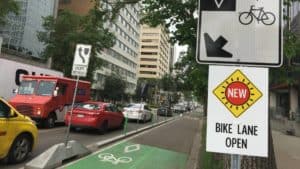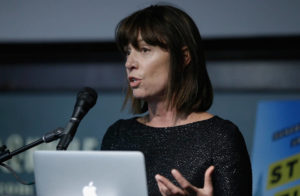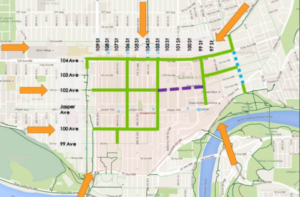Janette Sadik-Khan, who helped make Times Square walkable, applauds Edmonton’s quick progress

A transportation expert responsible for turning Times Square into a walkable, gargantuan retail hub praised Edmonton’s quick work installing the city’s bike lane network.
Janette Sadik-Khan, the former Commissioner of New York City’s transportation department, rode through Edmonton’s bike lane system Friday, getting a pulse for the city’s methods of transportation ahead of her speech Saturday at Metro Cinema.
“I think it’s really impressive to see how quickly Edmonton has implemented this downtown bike network,” Sadik-Khan told CBC’s Radio Active Friday.
She said it took her six years to put in 400 miles worth of bikes lanes throughout New York City — which is impressive, but so is Edmonton’s progress.
“To see what you’ve done in just a year to build this connected grid downtown is the equivalent of municipal light-speed,” she said.
Sadik-Khan is the author of Streetfight: Handbook for an Urban Revolution. She said cities need to rethink their city’s roads as major capital assets.

As cities change technologically and socially, the city’s roads should too.
“If you’re in business and you don’t change your major capital asset in 60 years, do you think you’d still be in business? Probably not,” she said.
She said cities should look at roads differently and look for ways to improve them. “That’s a real secret sauce for a more competitive city.”
‘Not anti-car’
The well-documented aversion to bike lanes in Edmonton’s downtown isn’t an Edmonton-only thing. Sadik-Khan faced similar opinions in her quest to diversify New York’s transportation options.
“There were 8.4 million New Yorkers and at one point, I thought there were 8.4 million traffic engineers because everyone had really strong opinions,” she said.

When New York City repurposed parking lots or driving lane space for bike lanes, cab drivers and other vehicle commuters would let the transportation department know.
“It was almost like taking away someone’s first-born child,” Sadik-Khan said.
But Sadik-Khan’s diversification of transportation options doesn’t mean the end of car travel as we know it.
“It’s not anti-car, it’s really pro-choice,” she said. “It’s also about making it more cost-effective for people to live, work and play in a city.”
To make a modern city more focused on living, working and playing, Sadik-Khan said city planners need to rethink how people want to travel — and she said Edmonton is well on its way.

“It’s really about building choices for people,” she said. “One of the basic ways to do that is to look at how we get around and how we prioritize what happens on the pavement.”


